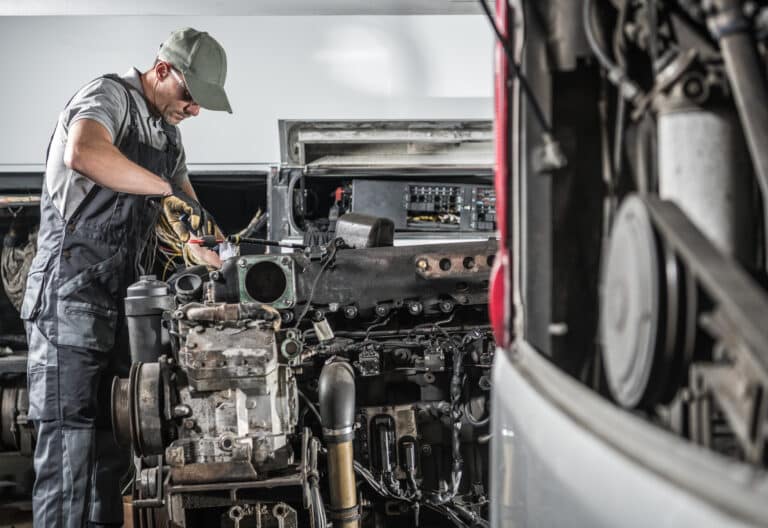A career in diesel mechanics is rewarding. If you have heard of diesel mechanics or are interested in pursuing a career as one, here’s a crazy fact – You don’t need a degree!
In this guide, we talk about the ins and outs of the career as a diesel mechanic (Professionally known as Diesel Technician), and you’ll also get a roadmap on how to become a diesel mechanic.

What is a Diesel Mechanic?
Okay, so you’ve probably thought about this – what does a diesel mechanic do? A diesel mechanic is a technician who inspects, maintains, and repairs automobiles related to diesel engines.
The primary duties of a diesel technician can be summarized as follow:
- Repairing diesel engines, water pumps, alternators, brakes, and clutches
- Installing and rebuilding hydraulic systems into bigger vehicles and cylinders.
- Changing oils, wiring, and troubleshooting hydraulic issues in automobiles.
- Ensuring preventive maintenance repairs of heavy vehicles.
- Maintaining driveline and brake components of trucks and tractors.
- Diagnosing and performing repairs of system failures.
- Inspecting and adjusting the wheels of the vehicles as needed.
- Analyzing vehicles’ performances with the help of test drives.
If you want to know more about the salaries of a diesel mechanic, here’s everything on what is a diesel mechanic?
How To Become A Diesel Mechanic?
If you’re interested in pursuing a career in the field of diesel mechanics, you might be wondering what are the steps to start your career.

Even though becoming a diesel mechanic sounds intimidating, it is relatively easy. Your main focus should be to choose the right training, as that will help you gain all the relevant knowledge and skills you will need when you enter the workforce.
Diesel Mechanic Training Requirements
The minimum requirement for you to become a diesel mechanic is first to complete your high school diploma or a GED. After that, you have to enroll yourself in a diesel mechanic training program that is best suited for you.
Choosing the right type of training will help you start your career faster as a diesel mechanic.
You can get your diesel mechanic training through three different methods –
- Associate Diesel Mechanic Degree
- Diploma or On-Campus Certification Program
- Online Certification Training Program
Here is more about each type of training program:
Option 1 – Associate Degree Program
- Timeline: 2 Years
- Cost: $30,000-$50,000
Getting an associate’s degree is considered to be the most popular option out of all. You can get an associate’s degree by enrolling in a full-time course at a university after completing your GED or high school diploma.
An associate’s degree is a 2-year program that helps you understand all the basics of diesel mechanics. Multiple colleges offer associate degree programs.
These programs, however, cost a fortune. An average associate’s degree costs around $30,000 to $50,000 and thus may often require students to take on education loans.
High cost and long course duration are two main reasons why we don’t recommend an associate degree program.
Option 2 – Certification or Diploma Programs
- Timeline: 1 Year
- Cost: $5,000-$10,000
In case you are willing to get a certified degree to become a diesel mechanic a bit quicker, then you can opt for Certification Programs.
These one-year programs assist you with understanding the basics and skills required for this profession.
Vocational colleges, community colleges, or trade schools typically offer certification programs, and they cost around $5,000 to $10,000, which is significantly better than getting an associate’s degree.
Option 3 – Online Program
- Timeline: 4-12 Months
- Cost: Upto $5,000
Online programs are considered to be the best out of all the options available. This is because choosing an online program will help you complete your training faster. You can complete these programs in as little as 6 months.
These programs also offer you to learn at your own pace, time, and schedule and are way cheaper than an associate’s degree or a certification program, costing just around $5,000.
The duration of the program can range anywhere between 6-12 months, and with an online program, you can complete your education from the comfort of your home. If you’re looking for diesel mechanic school, we recommend going for an online program.
Next Steps after Completing Your Education
After you have completed your training, here are a few steps you can take to start your career:
Get Your CDL
The next step in becoming a diesel technician is to get your CDL or a Commercial Driver’ License.
This will make you gain a legal license to drive heavy machinery. Getting your CDL after you complete your training and before you sit for your certification exams is required.
Become ASE Certified
After you complete your training and get a CDL, you will need to sit for your certification exam. For diesel mechanics, ASE or Automotive Service Excellence is regarded as the main certification authority.
ASE provides many diesel mechanic certifications, and if you’re starting your career, you can go for their entry-level certification, the G1 certification.
Employers highly prefer this certification, and as you gain more experience, you can get more ASE Certifications.
Look for Externships
Even though most online programs and training offer externship opportunities, you can also look for other opportunities on your own.
Getting an externship is vital for diesel mechanics and can help you gain appropriate hands-on training and skills needed to fulfill everyday tasks within the shop.
Externships also assist you in attaining industry experience and a chance for more practical knowledge.
Once your externship gets over, you can continue within the same company or shop, depending on your performance.
Apply for Jobs
The final step is to make your resume impressive by honing all the relevant skills you would need as a diesel mechanic and, finally, applying for all your shortlisted companies and shops.
Is It Difficult To Become A Diesel Mechanic?
Becoming a diesel mechanic can seem intimidating, although it is not that difficult once you start. While it is a very hands-on job where you have to work with diesel engines constantly, it is a highly rewarding career.
The U.S. Bureau of Labor Statistics (BLS) also reported that the expected job growth for diesel mechanics is around 4% by the year 2031, which makes it an ideal and demanded career for you to step foot into.
The BLS also reported that the national average annual diesel technician salary is $48,690, or $23.41 per hour.
Getting the right training should be your main focus while entering this field. It is recommended that you choose a program that is suited to your convenience, typically a program that doesn’t cost a fortune and allows you to learn at your own pace and schedule instead of scheduled classes.
Choosing an online program is thus highly recommended if you’re just starting your journey.

Skills Of A Proficient Diesel Mechanic
Diesel mechanics must have a few sets of skills that employers highly prefer. Such skills also help diesel mechanics deliver optimum service to customers. If you wish to enter this industry, there are some key skills you should note and work on, such as:
Technically Proficient:
Diesel mechanics are usually required to work with special equipment and machinery, and therefore they are required to have technical proficiency and basic know-how for dealing with diesel engines.
Physical Strength
The day-to-day duties of a diesel mechanic involve a lot of physical activity, such as standing for long hours, lifting heavy Diesel mechanic tools, and bending underneath the vehicles. Hence, diesel mechanics must have physical stamina and strength to deal with such labor daily.
Basic mathematical abilities
Even though advanced math knowledge is not necessary for diesel mechanics, they still need to know the basics of maths, like basic calculations and fractions.
Analytical skills
One of the key skills needed for a diesel mechanic is critical thinking and analytical skills. This can be especially useful in cases where the cause of any issues within the engine is not that apparent and needs the technician to investigate further and take appropriate action.
Detail-Oriented
Working with diesel engines can sometimes be complex, and missing even a tiny detail could worsen matters. Diesel mechanics are hence required to pay close attention to details.
Open to learning more
The field of diesel mechanics is constantly evolving, with more and more new technologies making their way into this industry.
Hence, diesel mechanics should be open to learning and adapting more technologies to provide optimum customer service.
Good communication skills
Diesel mechanics are often required to work in a team and hence are required to communicate efficiently within the team to ensure the smooth running of the project.
Also, diesel mechanics often have to interact with customers and break down what they’re doing in simple terms to them, which requires good communication skills.
Conclusion
Entering the field of diesel mechanics can be highly rewarding. Make sure you choose the right training program that fits your budget.
Also, once you have some training and you’re certified, you can visit your local shops and ask for available positions.
Related Resources:
- Diesel Mechanic Apprenticeship
- Diesel Mechanic Jobs
- Mobile Diesel Mechanic
- Heavy duty diesel mechanic
- Marine Diesel Mechanic
- How long is Diesel Mechanic School
- Diesel Mechanic Job Description
- Diesel Mechanic Requirements
- Diesel Mechanic Resume





